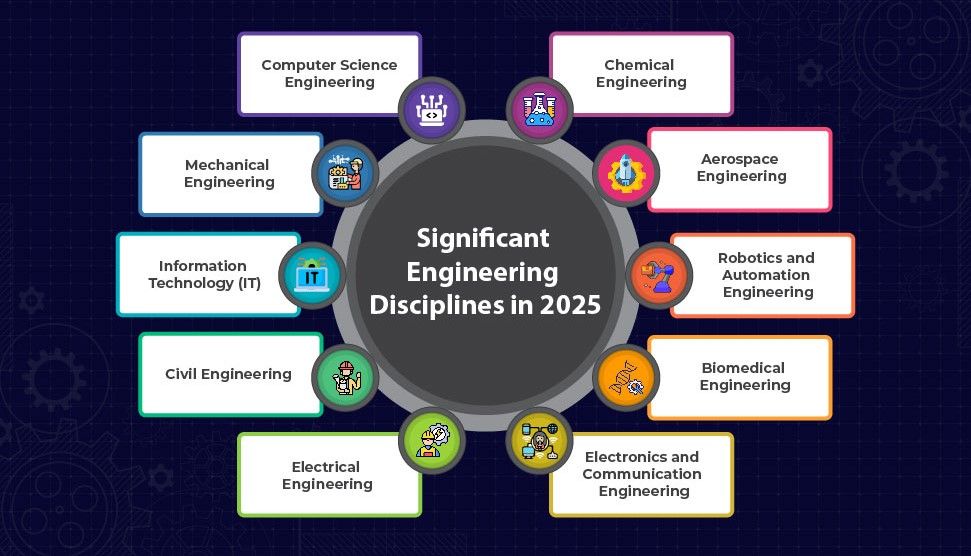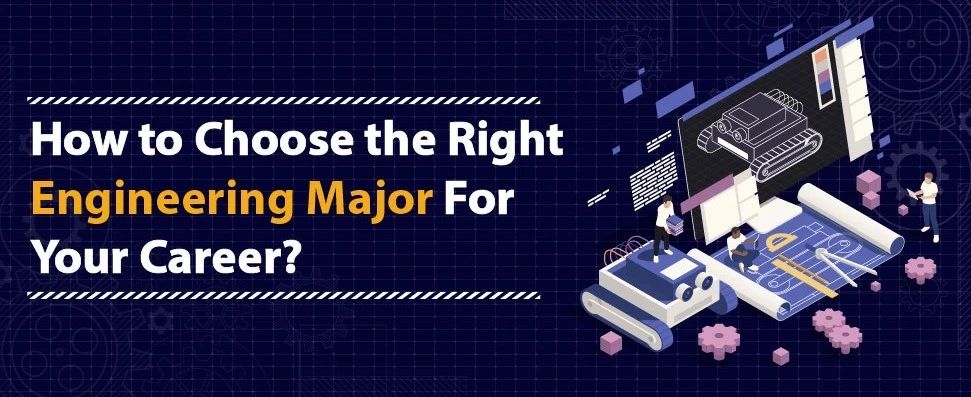Table of Contents
ToggleIntroduction
If you love to build simple solutions for complex problems, then you already know that a career as an engineer might be a great choice for you. As an engineer, you can develop intricate mechanisms and create cutting-edge innovations for every aspect of daily life. However, choosing among the many engineering majors can be a daunting task. Some of you might prefer the most sought-after civil, mechanical, and electrical, while some might want to explore trending domains like aerospace, robotics, biomedical, data systems, and environmental engineering. Whether you are already on the path to becoming an engineer or are still in a dilemma about which field to choose, this blog will help you find answers to many questions about choosing the right engineering major for your career. Let’s begin!

Don't miss out on your chance to work with the best
Apply for top global job opportunities today!
Significant Engineering Disciplines in 2025

Here are some of the most significant fields to look forward to in 2025, several engineering disciplines have been particularly impactful, driven by technological advancements, sustainability efforts, and global economic trends.
Here are some of the most significant fields:
Computer Science Engineering
In India, Computer Science Engineering (CSE) is an in-demand discipline due to the booming IT sector and increasing technological advancements. CSE provides a foundation in software development, algorithms, data structures, operating systems, and database management systems. Computer Science graduates can work in diverse fields, from AI and data science to software development.
Majors or specializations within CSE
- Artificial Intelligence (AI) and Machine Learning (ML)
- Data Science and Big Data Analytics
- Cybersecurity and Information Security
- Blockchain Technology
- Internet of Things (IoT)
- Cloud Computing
- Human-Computer Interaction (HCI)
- Software Engineering and Development
Top Computer Science Engineering Colleges in India
- IIT Delhi
- IIT Madras
- IISc Bangalore
- BITS Pilani
- NIT Trichy
Top Computer Science Engineering Colleges Around the World
- Massachusetts Institute of Technology (MIT), USA
- Stanford University, USA
- California Institute of Technology (Caltech), USA
- University of California, Berkeley, USA
- University of Oxford, UK
- National University of Singapore (NUS)
Computer Science Engineering Salaries in India
Entry level: INR 3.5 to 6 lakhs per annum
1-4 years of experience: INR 5-8 lakhs annually
Mid-level: INR 8-15 lakhs annually.
Senior-level: INR 15 lakhs per annum and more
Mechanical Engineering
Mechanical engineering covers mechanics, thermodynamics, materials science, and manufacturing. Mechanical engineers often work in automotive, aerospace, and robotics. As industries continue to automate, mechanical engineering with specializations in robotics and automation is increasingly vital. Engineers in this field develop robotic systems for manufacturing, healthcare, and even agriculture. Demand is especially strong for those who can design sustainable manufacturing processes and advanced automation technologies that enhance productivity while reducing environmental impact.
Majors or specializations within Mechanical Engineering
- Automotive Engineering
- Aerospace Engineering
- Robotics and Automation
- Energy Engineering
- Thermal and Fluid Engineering
- Mechatronics
Top Mechanical Engineering Colleges in India
- IIT Bombay
- IIT Madras
- IIT Delhi
- IIT Kharagpur
- BITS Pilani
- NIT Trichy
Top Mechanical Engineering Colleges Around the World
- MIT, USA
- Stanford University, USA
- University of Cambridge, UK
- ETH Zurich, Switzerland
- Imperial College London, UK
- University of California, Berkeley, USA
Mechanical Engineering Salaries in India
Entry level: INR 3-6 lakhs annually
Mid-level: NR 6-12 lakhs annually
Senior level: INR 12-25 lakhs annually
Information Technology (IT)
Information Technology (IT) is a dynamic field focused on computing technologies, software systems, network infrastructure, and data management. IT professionals work on creating, managing, and securing systems and applications across various industries, from finance and healthcare to education and retail. This versatility makes an IT graduate one of the most in-demand candidates, offering a wide range of specializations and career paths.
Key Majors or Specializations within IT
- Software Development and Programming
- Cybersecurity
- Data Science and Analytics
- Networking and Cloud Computing
- Artificial Intelligence and Machine Learning
- Database Management
- Web Development and Mobile Application Development
Top IT Colleges in India
- IIT Delhi
- IIT Bombay
- IIT Kanpur
- BITS Pilani
- Delhi Technological University (DTU)
- NIT Trichy
Top IT Colleges Worldwide
- MIT, USA
- Stanford University, USA
- University of California, Berkeley, USA
- Carnegie Mellon University, USA
- University of Cambridge, UK
- ETH Zurich, Switzerland
Information Technology (IT) Salaries in India
Entry level: INR 3-6 lakhs per year
Mid-level: INR 6-15 lakhs per year
Senior level: INR 15-30 lakhs or more per year
Civil Engineering
Civil Engineering is one of the oldest and most crucial branches of engineering, responsible for designing, constructing, and maintaining infrastructure such as buildings, roads, bridges, and water systems. Civil engineers work on a range of projects impacting urban development, transportation, and environmental sustainability. Given the rapid growth in infrastructure and urbanization, civil engineering remains a vital field with numerous specializations.
Key Majors or Specializations within Civil Engineering
- Structural Engineering
- Geotechnical Engineering
- Environmental Engineering
- Transportation Engineering
- Water Resources Engineering
- Construction Engineering and Management
- Urban and Regional Planning
Top Civil Engineering Colleges in India
- IIT Delhi
- IIT Bombay
- IIT Madras
- IIT Kharagpur
- Delhi Technological University (DTU)
- NIT Trichy
Top Civil Engineering Colleges Worldwide
- MIT, USA
- Stanford University, USA
- University of Cambridge, UK
- ETH Zurich, Switzerland
- Imperial College London, UK
- University of California, Berkeley, USA
Civil Engineering Salaries in India
Entry level: INR 3-5 lakhs annually
Mid-level: INR 6-12 lakhs annually
Senior level: INR 15-25 lakhs or more annually
Electrical Engineering
Electrical Engineering is a broad and essential field that deals with the study and application of electricity, electronics, and electromagnetism. This discipline is foundational to modern technology, playing a critical role in everything from power generation to telecommunications and electronics. Electrical engineers design, test, and maintain electrical systems, often specializing in fields that cater to various industries.
Key Majors or Specializations within Electrical Engineering
- Power Systems Engineering
- Control Systems Engineering
- Telecommunications Engineering
- Microelectronics and Semiconductor Engineering
- Signal Processing
- Instrumentation Engineering
- Embedded Systems
Top Electrical Engineering Colleges in India
- IIT Delhi
- IIT Bombay
- IIT Madras
- IIT Kanpur
- BITS Pilani
- NIT Trichy
Top Electrical Engineering Colleges Worldwide
- MIT, USA
- Stanford University, USA
- University of Cambridge, UK
- ETH Zurich, Switzerland
- National University of Singapore (NUS)
- University of California, Berkeley, USA
Electrical Engineering Salaries in India
Entry level: INR 3-5 lakhs annually
Mid-level: INR 6-12 lakhs annually
Senior level: INR 15-25 lakhs or more annually
Electronics and Communication Engineering
Electronics and Communication Engineering (ECE) is a broad field that merges concepts from both electronics and telecommunications. ECE covers the design, development, and maintenance of communication systems and electronic devices, from cell phones and satellite systems to advanced computing hardware and IoT (Internet of Things) technologies. ECE graduates are highly sought after in industries like telecommunications, embedded systems, robotics, and consumer electronics.
Key Majors or Specializations within Electronics and Communication Engineering
- Telecommunications Engineering
- Embedded Systems
- VLSI (Very-Large-Scale Integration) Design
- Signal Processing
- Robotics and Automation
- Optical Communication
- Microelectronics
Top Electronics and Communication Engineering Colleges in India
- IIT Bombay
- IIT Delhi
- IIT Madras
- IIT Kanpur
- NIT Trichy
- Delhi Technological University (DTU)
Top Electronics and Communication Engineering Colleges Worldwide
- MIT, USA
- Stanford University, USA
- National University of Singapore (NUS)
- University of California, Berkeley, USA
- University of Cambridge, UK
- ETH Zurich, Switzerland
Electronics and Communication Engineering Salaries in India
Entry level: NR 3-6 lakhs per year (higher for VLSI and telecommunications roles)
Mid-level: INR 7-15 lakhs annually
Senior level: More than INR 20-30 lakhs annually
Salaries in the ECE field are often higher in metropolitan areas and can vary based on industry demand. Professionals in high-growth areas such as telecommunications, IoT, and semiconductor manufacturing tend to have increased earning potential.
Biomedical Engineering
Biomedical Engineering (BME) combines engineering principles with medical sciences to create technology and systems that help improve healthcare. From medical imaging and diagnostic devices to bioinformatics and tissue engineering, biomedical engineers are at the forefront of advancing medical treatments, diagnostics, and overall patient care.
Majors or Specializations within Biomedical Engineering
- Biomaterials and Tissue Engineering
- Medical Imaging and Instrumentation
- Biomechanics
- Bioinformatics and Computational Biology
- Neural Engineering
- Rehabilitation Engineering
- Cell and Molecular Engineering
Top Biomedical Engineering Colleges in India
- IIT Delhi
- IIT Bombay
- IIT Vellore
- Manipal Institute of Technology (MIT), Manipal
- National Institute of Technology (NIT) Rourkela
- All India Institute of Medical Sciences (AIIMS), New Delhi
Top Biomedical Engineering Colleges Worldwide
- MIT, USA
- Johns Hopkins University, USA
- Stanford University, USA
- University of Cambridge, UK
- ETH Zurich, Switzerland
- National University of Singapore (NUS)
Biomedical Engineering Salaries in India
Entry level: INR 3-6 lakhs per year
Mid-level: INR 7-12 lakhs per year
Senior level: INR 15-25 lakhs per year
Robotics and Automation Engineering
Robotics and Automation Engineering focuses on designing, developing, and deploying robotic systems and automated processes across a range of industries, including manufacturing, healthcare, automotive, and aerospace. With the increasing demand for automation and artificial intelligence, this field is growing rapidly and offers vast career opportunities worldwide.
Majors or Specializations within Robotics and Automation Engineering
- Industrial Automation
- Artificial Intelligence and Machine Learning
- Human-Robot Interaction (HRI)
- Embedded Systems and Control Engineering
- Robot Kinematics and Dynamics
- Mechatronics
- Autonomous Systems and Robotics
- Bio-Robotics
Top Robotics and Automation Engineering Colleges in India
- IIT Bombay
- IIT Kanpur
- IISc Bangalore
- BITS Pilani
- Vellore Institute of Technology (VIT), Vellore
- Manipal Institute of Technology (MIT), Manipal
Top Robotics and Automation Engineering Colleges Worldwide
- MIT, USA
- Stanford University, USA
- ETH Zurich, Switzerland
- Carnegie Mellon University (CMU), USA
- University of Tokyo, Japan
- Technical University of Munich (TUM), Germany
Robotics and Automation Engineering Salaries in India
Entry level: INR 4-8 lakhs per year
Mid-level: INR 8-15 lakhs per year
Senior level: INR 15-30 lakhs per year
Aerospace Engineering
Aerospace Engineering is a branch of engineering focused on the design, development, and testing of aircraft and spacecraft. This field is divided into two main areas: aeronautics, which deals with aircraft within Earth’s atmosphere, and astronautics, which focuses on spacecraft and technologies used in outer space. Aerospace engineers work across sectors, including defense, aviation, and space exploration, making it a diverse and technologically intensive field.
Majors or Specializations within Aerospace Engineering
- Aerodynamics
- Propulsion Systems
- Avionics
- Structures and Materials
- Flight Mechanics and Control Systems
- Spacecraft Design and Astrodynamics
- Systems Engineering
Top Aerospace Engineering Colleges in India
- Defence Institute of Advanced Technology, Maharashtra
- IIT Bombay
- IIT Kanpur
- IIT Madras
- Indian Institute of Science (IISc), Bangalore
- Punjab Engineering College (PEC), Chandigarh
- Manipal Institute of Technology (MIT), Manipal
Top Aerospace Engineering Colleges Worldwide
- University of Michigan, USA
- Delft University of Technology, Netherlands
- Technical University of Munich (TUM), Germany
- University of Tokyo, Japan
- Stanford University, USA
Aerospace Engineering Salaries in India
Entry level: INR 4-8 lakhs per year
Mid-level: NR 8-15 lakhs per year
Senior level: INR 15-30 lakhs per year
Chemical Engineering
Chemical Engineering is a branch of engineering focused on designing processes to convert raw materials into valuable products through chemical, physical, and biological transformations. This field spans industries such as pharmaceuticals, petrochemicals, food processing, environmental engineering, and energy production, making it versatile and essential for numerous industrial processes.
Majors or Specializations within Chemical Engineering
- Process Engineering
- Biochemical Engineering
- Environmental Engineering
- Materials Science and Engineering
- Petroleum Engineering
- Thermodynamics and Reaction Engineering
- Nanotechnology
Top Chemical Engineering Colleges in India
- Institute of Chemical Technology (ICT), Mumbai
- IIT Bombay
- IIT Delhi
- IIT Madras
- IIT Kanpur
- National Institute of Technology (NIT) Trichy
Top Chemical Engineering Colleges Worldwide
- MIT, USA
- Imperial College London
- National University of Singapore (NUS)
- ETH Zurich
- Stanford University, USA
- University of California, Berkeley (UCB)
Chemical Engineering Salaries in India
Entry level: INR 4-8 lakhs per year
Mid-level: INR 8-15 lakhs per year
Senior level: INR 15-30 lakhs per year
Chemical engineering offers higher packages in top companies in petrochemicals, pharmaceuticals, and materials science. With increasing demand for specialized knowledge in sustainable processes, advanced materials, and bioengineering, chemical engineering offers a stable career trajectory.
How to Choose the Right Engineering Major For Your Career?

Choosing the right engineering major is a pivotal decision, as it sets the foundation for your career path, skills, and industry opportunities. Here’s a step-by-step guide to help you decide which major aligns best with your goals and interests:
Assess Your Interests and Strengths
- Start by identifying areas in science, math, or technology that you find intriguing. Are you fascinated by computer systems, structures, or solving environmental problems? Knowing what naturally attracts you will guide your choice.
- Consider your skills and strengths as well. For instance, if you excel at programming and logical problem-solving, a major in Computer Science or Software Engineering might be suitable. If you enjoy building and designing systems, Mechanical or Electrical Engineering could be a better fit.
Explore Career Opportunities and Industry Demand
- Research career prospects associated with different engineering fields. Certain sectors, like software development and cybersecurity, are growing rapidly, making Computer Science and Information Technology very marketable. Meanwhile, industries like Civil Engineering remain steady due to continuous infrastructure needs.
- Look into job placement rates and average salaries for each major. According to the U.S. Bureau of Labor Statistics, fields like Aerospace Engineering and Petroleum Engineering tend to offer higher-than-average salaries, although job availability may fluctuate based on industry demand and economic factors.
Consider the Educational Requirements and Difficulty Level
- Some engineering majors have intense coursework in areas like physics, calculus, or chemistry, which could be more challenging depending on your background. For instance, Chemical Engineering typically requires a strong understanding of chemistry and process engineering.
- Investigate the curriculum for each program to understand the subjects and hands-on experience involved. Some programs, like Environmental Engineering, may offer a mix of biology and sustainability-focused courses, which might be better suited for those interested in environmental sciences.
Think About Long-Term Goals and Flexibility
- If you’re looking for versatility, fields like Mechanical Engineering or Electrical Engineering offer broad applicability across multiple industries, from automotive to aerospace.
- For those considering future specialization or graduate studies, certain majors offer clearer paths. Biomedical Engineering, for example, allows students to pursue careers in healthcare innovation and can lead to advanced studies in biotechnology or medical device development.
Consider the Societal Impact and Personal Satisfaction
- Reflect on the societal impact of each field and what kind of contributions you want to make. Fields like Environmental Engineering or Civil Engineering focus on sustainability, infrastructure, and improving public spaces, which may appeal to those who want to make a positive impact on communities.
- Personal satisfaction in your field can greatly influence your job fulfillment. Some people thrive in fast-paced, ever-evolving fields like software, while others prefer the long-term projects often found in civil or structural engineering.
Seek Advice and Real-World Exposure
- Speak with professionals in various engineering fields to get insights into what their day-to-day work entails. Internships or job shadowing can provide hands-on experience and help clarify your interests.
- Talk to academic advisors, career counselors, and professors to understand the pros and cons of each major. Many colleges also offer exploratory courses in the first year to help students decide.
Conclusion
Choosing the right engineering major requires a blend of self-assessment, industry research, and real-world insights. Evaluate your interests, strengths, and career goals, and keep in mind that some engineering fields offer broad versatility while others specialize in high-demand or impactful areas. Each engineering discipline comes with its own set of challenges and rewards, so selecting one aligned with your aspirations will set the stage for a satisfying and successful career path. If you are looking to explore a promising career in engineering, sign up with Olibr now!
Take control of your career and land your dream job
Sign up with us now and start applying for the best opportunities!

FAQs
Python, MATLAB, C++, JavaScript, and SQL are among the top programming languages for mechanical engineers.
Yes, an engineer can become a data scientist by building a strong foundation in statistics, programming (especially in Python or R), and data analysis.
NASA, Google, Apple, Microsoft, U.S. Department of the Navy, Samsung, and Walt Disney Company are a few global companies where engineers can work.
The average engineer salary in the USA is $107,444 per year or $51.66 per hour. Entry-level positions start at $82,544 per year, while most experienced workers make up to $154,150 per year.

